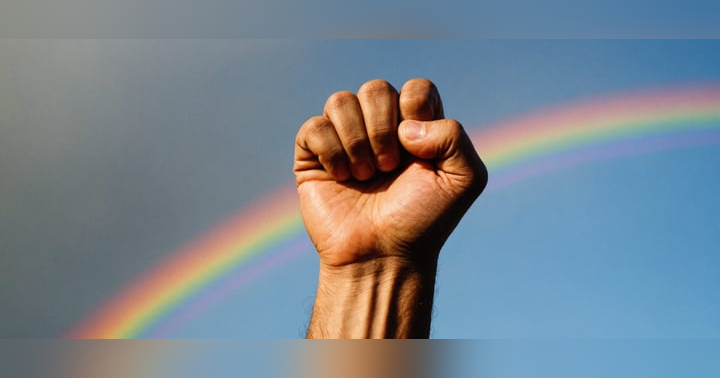Why 'That's So Gay' is More Harmful Than You Think

You Really Shouldn’t Say That
Saying "that's so gay" as an insult might seem like harmless banter to some, especially to those who casually use the phrase—looking at you, straight people—but its impact runs much deeper.
For many of us, particularly gay men, growing up, "gay" wasn't just a word; it was a label often attached to things considered bad, weird, or inferior. Even before we fully understood what it meant to be gay, we learned that being gay was something to avoid, something negative. These casual expressions perpetuate harmful stereotypes and reinforce a culture of shame, making it crucial to rethink the power of words we might not realize can hurt.
A Brief History of the Word "Gay"
The word "gay" has evolved significantly over time, and understanding its history is essential to recognizing the harm in its modern usage as an insult. According to The Gayly, the word dates back to the 12th century and originates from the French word gai, meaning joyful or carefree. It wasn’t until the 1600s that the word acquired a sexual connotation, as its meaning of being carefree evolved to suggest promiscuity. In fact, brothels were often referred to as gai houses.
By the 1890s, a Scottish variant of the word, gey cat, emerged to describe a vagrant offering sexual services, specifically a young man accompanying an older one, which hinted at a submissive role. This usage likely helped establish the association between the word "gay" and homosexuality. It wasn’t until 1951 that "gay" appeared in the Oxford English Dictionary as a slang term for homosexual, though it had likely been used in this context underground for about 30 years prior.
By the 1990s, however, the word "gay" began to be used negatively, to describe things considered "stupid" or "undesirable." Urban Dictionary further defines this usage as something "lame, dull, or boring"—essentially, something lacking substance. This shift in meaning plays a key role in how the word is used today in harmful ways, as it continues to carry a stigma tied to the LGBTQ+ community.
The Growing Awareness Around "That's So Gay" as an Insult
For years, the phrase "that's so gay" was largely dismissed as a harmless playground putdown, a passing insult with little consideration of its deeper impact. However, by the late 2000s, conversations began to emerge about the harm it caused, signaling a shift in how society viewed the language surrounding LGBTQ+ issues. One of the earliest efforts to address this came in 2008, when the Gay, Lesbian, and Straight Education Network (GLSEN) launched the Think Before You Speak campaign. This initiative, which included TV, radio, and magazine ads, sought to raise awareness about the casual use of derogatory language among youth.
The campaign highlighted the prevalence of terms like "that's so gay" in American schools and underscored their harmful effects, particularly in relation to the mental health and well-being of LGBTQ+ students. It also came at a time when LGBTQ+ youth suicide rates were a growing concern. GLSEN invested $2 million in the campaign, enlisting celebrities like Wanda Sykes and Hilary Duff to urge young people to reconsider their words and the consequences they could have.
Despite these efforts, the phrase "that's so gay" continue to be used frequently by many, contributing to an environment where LGBTQ+ individuals may feel uncomfortable and marginalized. For many young people still grappling with their identities, hearing the term used as an insult can create a constant fear of being labeled or singled out.
The Impact of "That's So Gay" and the Push for Change
In 2009, Neal Conan, host of Talk of the Nation, addressed the issue of teenagers using the phrase "that's so gay" in a segment that featured Professor Geoffrey Nunberg from the University of California, Berkeley, and Eliza Byard, then executive director of GLSEN.
During the discussion, the harmful implications of this phrase were explored, particularly how it equates being gay with something bad or undesirable. Although the phrase may not always be intended as an insult, its widespread use contributes to a culture of homophobia.
Eliza Byard highlighted the alarming prevalence of the phrase in schools, noting that more than 90% of LGBTQ+ students reported hearing it frequently. She pointed out that this casual use of homophobic language is a "broken window" that signals a broader, more serious issue of discrimination.
Byard explained that failing to address such everyday language sets the tone for more harmful behaviors, including verbal and physical harassment, which are disturbingly common in schools. In fact, 83% of LGBTQ+ students experience targeted verbal harassment.
She also emphasized that while policies and training were crucial for addressing more overt incidents of bullying, the Think Before You Speak campaign aimed to tackle the "low-level, tolerated background noise" of terms like "that's so gay," which help perpetuate a culture of intolerance.
The Harm of "That's So Gay" as a Microaggression
In a 2018 Psychology Today article, Dr. Joe Kort, a licensed psychologist, addressed the harmful impact of the phrase "that's so gay," labeling it as a microaggression, which are subtle, often unconscious insults or indignities that target socially marginalized groups. While many may brush off these slights, they still carry weight. Dr. Kort argues that no matter how normalized the phrase becomes, it remains inherently pejorative and homophobic, particularly damaging to those struggling with their sexuality.
For LGBTQ+ youth, hearing "that's so gay" can evoke feelings of shame and isolation, as the phrase reinforces negative stereotypes about their identities. Dr. Kort explains that language like this can have deep psychological consequences for young people, especially those who are already grappling with their sexuality in an unsupportive environment.
He illustrates this with examples of his own clients: one client remembered his father pointing out a building and referring to it as a place for "faggots to dance," unaware that his son was struggling with his own identity. Another client recalled his parents' horror when they discovered he was looking at gay pornography, followed by a painful denial of his identity. These personal stories highlight the lasting emotional toll of microaggressions, compounded by casual phrases like "that's so gay."
Dr. Kort emphasizes the importance of understanding the power of language, noting that while many people equate terms like LGBTQ+ with adult sexuality, for LGBTQ+ youth, the term has nothing to do with that and often reflects feelings of invisibility. For these young people, hearing the phrase "that's so gay" reinforces the notion that their identity is something to be ashamed of, making their world feel unsafe.
He describes LGBTQ+ children as "little spies," constantly assessing whether their surroundings are safe or dangerous based on the language and behavior they encounter daily. In this context, seemingly harmless phrases have the power to shape how these young people perceive their relationships and their place in the world.
The Persistent Impact of Homophobic Language in Schools
With this in mind, the harmful effects of phrases like "that's so gay" continue to plague schools today. According to GLSEN's 2022 National School Climate Survey, nearly all LGBTQ+ students (97%) reported hearing the term "gay" used negatively at school, often as an insult. This kind of language contributes to a climate of distress, with 93.7% of LGBTQ+ students expressing that such remarks negatively affected their mental and emotional well-being. Additionally, 89.9% reported hearing other derogatory terms like "dyke" or "faggot," with 44.2% stating that they heard these harmful phrases frequently.
The survey also revealed some shocking statistics about the daily realities of LGBTQ+ students in schools. A staggering 81.8% of students reported feeling unsafe due to their actual or perceived sexual orientation or gender identity. In response, 32.2% of LGBTQ+ students missed at least one school day in the past month because they felt unsafe or uncomfortable, with 11.3% missing four or more days. And nearly one in five students even reported changing schools due to feeling unsafe.
The situation is further compounded by the behavior of school staff. GLSEN found that 58% of students heard homophobic remarks from teachers or staff, while 72% reported hearing negative comments about gender expression. Alarmingly, only 10% of students said that school staff intervened consistently when they overheard homophobic or gender-related remarks. The lack of intervention from school authorities only exacerbates the harassment LGBTQ+ students face, which includes verbal (60.7%), physical (22.4%), and sexual harassment (53.7%).
Addressing the Harm of "That's So Gay" in Everyday Conversations
Given the troubling statistics and persistent use of harmful language like "that's so gay," it's clear that something must be done to address its impact. The most important step in combating this issue is to speak up when you hear it. Ignoring derogatory language only allows it to persist, potentially escalating over time. Silence sends a message that such behavior is acceptable, which can embolden others to use harmful terms without consequence.
The Human Rights Campaign Foundation's Welcoming Schools program offers useful guidance on how to respond when you hear phrases like "that's so gay." First, it’s essential to intervene. Harassment doesn’t go away on its own, and by remaining silent, you’re signaling that the person targeted won’t be protected. It’s better to say something, even if it’s a simple, brief response. You could ask, "Do you know what gay actually means?" or state, "It’s not okay to use the word gay to mean something bad." Even a straightforward correction can make a difference.
If the opportunity arises, take the time to educate. Explain that using "gay" in a negative way is disrespectful, especially to those who may have LGBTQ+ friends or family members. While it may be challenging, try to avoid assuming bad intentions. Often, people use harmful language without realizing its impact, and providing constructive feedback can help raise awareness.
Beyond reacting to phrases like "that's so gay," it's crucial to be mindful of our language in general. In a world where insults and quick retorts have become common, it's easy for conversations to escalate unnecessarily. Being intentional with our words helps create more respectful and inclusive spaces for everyone.
The Power of Mindful Language
When faced with situations where phrases like "that's so gay" are used, it’s easy to retreat or respond defensively without taking the time to address the issue thoughtfully. While it can be tempting to assume ill intent when someone uses such language, it’s important to remember that the person may simply be unaware of the harm they’re causing. Instead of reacting impulsively, consider using a calm and assertive response to stop the harmful language and educate the person about why it’s inappropriate.
This may not always be easy, especially when the words hit close to home. Many LGBTQ+ individuals have experienced the sting of hearing "that’s so gay" or other derogatory terms used as insults. These moments can evoke deep feelings of insecurity and discomfort. However, even though it may feel challenging, it's crucial to respond in a way that encourages understanding.
As we’ve seen, being mindful of our words and addressing harmful language when we encounter it can help foster a more respectful environment for everyone. We all have the responsibility to reconsider how we use language and to educate others when necessary. Speak up, educate, and work towards a more inclusive world where harmful phrases no longer hold power.
And remember: every day is all we have, so you've got to make your own happiness.
For more information on this topic, listen to Episode 69. That's So Gay (You Really Shouldn't Say That).
Tune into your favorite podcast player every Tuesday for new episodes of A Jaded Gay.


















